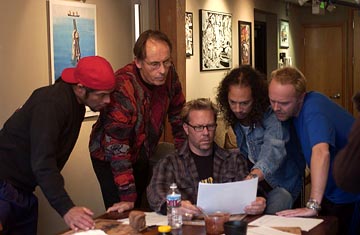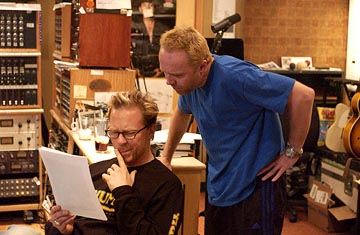

Metallica disappeared off the face of the earth during the late nineties. Aside from S&M, their live album produced in conjunction with the San Francisco Symphony, their last albums were the disappointing Load and Re-Load. The only peep people heard from them was drummer Lars Ulrich's diatribes against Napster, which managed to alienate much of their fan base. Early in 2001, Metallica reconvened and decided to start production on a new album, later to be titled St. Anger. Directors Joe Berlinger (One Who Day, Book of Shadows) and Bruce Sinofsky (One Who Day, Revelations: Paradise Lost 2) followed them around to produce a documentary. Metallica contributed music to the Paradise Lost movies, so they were familiar with Berlinger and Sinofsky. As the recording sessions progressed, it was clear that Metallica was in serious trouble. Berlinger and Sinofsky were able to capture all of it and distill it into Some Kind of Monster, an absorbing documentary about a band nearing implosion.
One does not need to be a fan to appreciate this documentary. In fact, some fans may be annoyed at the relative lack of concert footage. However, Some Kind of Monster is not about the music the band makes, it is about the members of the band itself, and how they interact with each other. Metallica the band is one of the godfathers of heavy metal. They are a mainstay in an industry where bands come and go. They formed nearly twenty years ago, and are famous for their loud, aggressive speed-metal. Their 1991 album was a bit more commercial, and led to much wider mainstream success, which may have been part of the reason for their implosion.
At the heart of Metallica was a clash of personalities. Lead singer James Hetfield ruled at times like a tyrant. He recently kicked out bassist Jason Newstead, who wanted to have more creative freedom, and spend some time in a side band. Together, Hetfield, Ulrich, Newstead, and Kirk Hammett toured and recorded for most of Metallica's professional life. For the recording, producer Bob Rock would sub for Newstead, and it was decided that the process would be more collaborative this time around. A stint to rehab for Hetfield derailed the recording sessions, and threw the future of the band in limbo. This was something that Hetfield had to do, but nobody knew if he would ever return. He eventually did, although there were a number of restrictions placed upon him that affected the band as a whole. Of course, this led to additional clashes.
In a sense, these clashes are what helped fuel Metallica creatively. They could funnel their rage and aggression into their songs. Differing personalities allowed them to remain fresh, and to never be too complacent. To help them with this, they hired Phi Towle to help them with their issues. He had a whopping $40,000 month consulting fee, and makes them sit down and talk about their feelings. Yes, people get to watch Metallica get in touch with their touchy-feely sides. The good thing is that the band later unites against Towle, who seems to think he is an adjunct member of Metallica. There is even a teary reconciliation of sorts between Ulrich and ex-member Dave Mustaine, who was kicked out of the band and later went on to form Megadeath. It's fascinating that despite the tremendous success of his band, he is still extremely bitter and views things in light of his oust from the band. This is where Some Kind of Monster is the most fascinating. The film takes a glimpse into the lives of the band members, ignoring their loud, brash on stage personalities. They kept filming although at times the future of the band was extremely uncertain.
It does feel a tad pretentious at times. All of the band members are talking to each other about how important their music is, and at one point they directors even come on screen to talk about whether it was appropriate to keep the cameras rolling. Nevertheless, the subjects tacked in the film are a bit too close to home for this to be a fluff piece. The viewer gets to see a band reexamine its core values and beliefs, which led to the recording of St. Anger (recorded in an old prison), a return of sorts to their old, rawer, less commercial sound. One can also see how the band mates changed over time. They started off as angry teenagers, and now Hetfield and Ulrich are married with children. This forces them to live differently, especially Hetfield. It's rare that a band lets people take such an unflinching, intimate look into their personal and professional lives like Metallica does here.